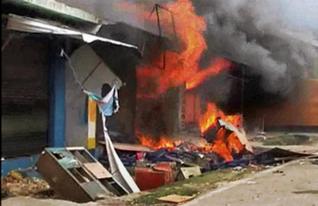
Srinagar, Aug 10: Authorities imposed curfew and called out the Army to control the situation as two persons died and around 80 sustained injuries in the worst communal riots to shake Jammu and Kashmir at Kishtwar on Friday.
Official sources said people from the peripheral villages of Bandirna, Hullar and Kuleed were heading for the spacious Chowgan Grounds to join congregational Eid-ul-Fitr prayers around 10 a.m., when a section of local Hindus objected to their pro-azadi slogans. What began as an altercation culminated into a major clash in which people from both sides resorted to intense stone-throwing.
Even as over 10,000 people performed Eid prayers, some miscreants ransacked commercial properties and set shops and vehicles on fire. The district headquarters turned into a battlefield with even government-controlled Village Defence Committee (VDC) members and Special Police Officers joining the violence in some cases using firearms. Private firing with .12 bore guns was also reported.
IGP (Jammu) Rajesh Kumar said from Kishtwar that the four-hour-long riots left two persons of the two communities dead and 23 civilians injured. However, independent sources claimed that around 80 persons, including 40 police and CRPF personnel, sustained injuries. They said 23-year-old Arvind Kumar Bhagat, son of the local BSP leader Desraj Bhagat, died of gunshot wounds. Some reports said he was hit when the police opened fire on a mob. However, some officials insisted that Mr. Bhagat was found hit by a private weapon as there was evidence of .12 bore ammunition on his body.
Sources said one unidentified person of the other community was manhandled, set on fire and burnt to death. His body was lying on the Chowgan Grounds till late on Friday night.
One petrol tanker, one police bunker, a number of buses and cars were among the 60 vehicles destroyed in fire. As many as 70 shops, one hotel and one residential house were destroyed in the arson as the police and the civil administration failed completely to control the situation.
Shaheedi Road, Malik Market, Kuleed Chowk, Dak Bungalow Chowk, Amar Market, Bus Stand and Hospital Market witnessed the worst of arson. Reports said some peripheral villages were also engulfed by late afternoon.
While Minister of State for Home and Kishtwar MLA Sajad Ahmad Kichloo is already in town, Chief Secretary Iqbal Khanday and Director-General of Police Ashok Prasad flew in to Kishtwar from Srinagar. Divisional Commissioner (Jammu) Shant Manu and Inspector-General of Police Rajesh Kumar also reached the spot. They called out the Army even as the Deputy Commissioner imposed indefinite curfew. After a flag march by the Army, situation was reportedly under control.
Tension also spread to Jammu, Samba and Udhampur district headquarters as some markets closed in protest and some people staged demonstrations.





Comments
Add new comment